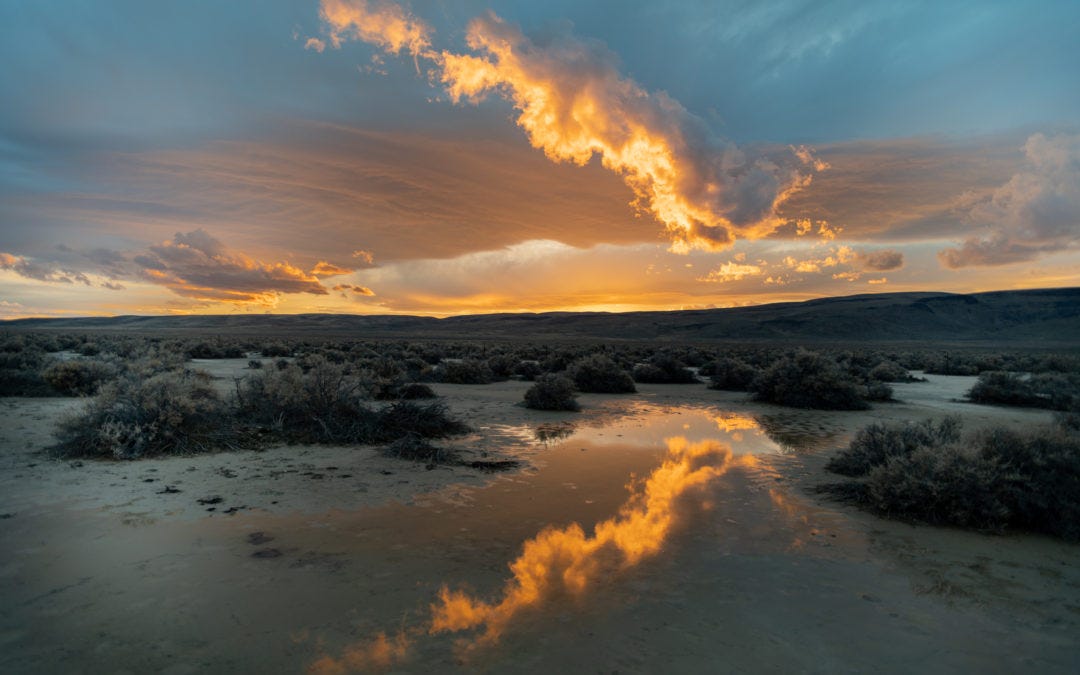While I finish two essays, I cannot recommend presentations from Max Wilbert and Julia Barnes highly enough. And please read the definitively welcome news from Brazil!
--Katie Singer
Max Wilbert on the Thacker Pass Lithium Mine
& the Failure of Green Growth
In his talk for the Canadian Association of the Club of Rome (CACOR), Max Wilbert shows photographs of flora and fauna at Thacker Pass, Nevada before Lithium Americas began constructing its lithium mine. Then, he lays out the ecological impacts of mining. Max speaks plainly about his failed efforts to stop Lithium Americas Corporation from mining Thacker Pass. He explains that with fossil fuels, pollution is often visible during consumption. With e-vehicles, solar PVs, wind power and batteries, pollution is invisible at the consumption site—although “green” technologies require fossil fuels and wreak havoc on wildlife. Max asks, “Is it worth destroying ecosystems so we can have technologies that depend on extracted minerals and fossil fuels?” He names options for caring for the Earth in these extractive times. Challenge your thinking and watch Max Wilbert’s talk!
For background, see my June substack, “When Land I Love Holds Lithium: Max Wilbert on Thacker Pass, Nevada.”
FYI, Max co-authored Deep Green Lies: How the Environmental Movement Lost Its Way and What We Can Do About It with Derrick Jensen and Lierre Keith.
Julia Barnes on deep-sea mining
Julia Barnes has directed two documentaries: “The Sea of Life” (2017) and “Bright Green Lies” (2021). Earlier this month, she presented “The Imminent Threat of Deep-Sea Mining” for the Canadian Association of the Club of Rome. She showed spectacular photos from the ocean, then reported that corporations want to turn the deep sea into the planet’s largest contiguous mining area…to mine cobalt, copper, nickel and manganese for smartphones, EVs, solar PV storage and other technologies. Julia explains how deep-sea mining would devastate ecosystems that take millions of years to form—and the current state of regulation around deep-sea mining. She’s clear that destroying the Earth will not help humanity or other species to survive.
I also recommend highly her very brief video, Deep Sea Mining: What Could It Do to the Ocean?
For more background, read Mining the Sacred, which Dr. Aaron French and I co-authored.
The Seaweed Delusion
Canada’s ETC Group has just released “The Seaweed Delusion: Industrial seaweed will not cool the climate or save nature.” Again, we have to ask whether industrial-scale technologies “rewild” ecosystems—or generate profits?
Wonderful, Welcome News
In September, 2021, I posted, “If Brazil burns what’s left of the Amazon, why hold COP26?” Last week, Brazil’s Supreme Court voted in favor of Indigenous rights—which may translate to protections for the Amazon.
Mapping Our Technosphere
Last, I’m still fundraising to finish Mapping Our Technosphere. The book illuminates the supply chains that make the Internet possible. Introduced by the late Jerry Mander, it includes Miguel Coma’s reports about why 5G is great for private-factory networks—and unnecessary for public networks. It challenges users to trace the supply chain of one substance in a computer; it challenges engineers to make biodegradable computers. Can you help this book get to the printer? It needs $15,000 for rare images’ copyright permits; for editing, design, website expenses…and to keep its author fed and sheltered. Ecological Options Network, my fiscal sponsor, can take donations of $500 or more. Please address your check to EON, and write “Katie Singer book project” in the memo area. Address the envelope to Mary Beth Brangan, EON Co-Director, POB 1047, Bolinas, CA 94924.
Smaller (still much appreciated!) donations can go through PayPal or directly to me, at PO Box 6574 Santa Fe, NM 87502 USA.
Or, sign up for a paid subscription to this substack!





Thanks for writing. Thanks for your questions.
First, Max Wilbert is a writer and activist trying to stop lithium mining, not a scientist. He co-authored Bright Green Lies, which reports on the ways that solar, wind and e-vehicles ravage ecosystems. Julia Barnes is a filmmaker. She made the documentary Bright Green Lies. In the talk and film I recommended, she reports on deep sea mining for substances needed for e-vehicles, solar and wind power. She's not a scientist, either.
As I understand, CACOR believes in limits to growth. Donella Meadows and two others published Limits to Growth in 1972. They predicted that if we continued producing and consuming industrially-made goods and growing our economy and population, then we could expect significant increases in flooding, drought, famine and war. They made accurate predictions, as I see it. The Club of Rome and Limits to Growth are somehow affiliated--but I don't know how.
Climate change. In my perception, globally, our climate is changing. Ice is melting, ocean temperatures are rising. We've got severe flooding, drought and extremely high temperatures in many areas. When people say that climate change is a scam, I sincerely do not understand. I have written extensively about the ways that solar PVs, industrial wind, batteries and e-vehicles destroy ecosystems and communities. They pose major fire hazards. They do not reduce our impact on the Earth. I do not welcome any government subsidizing these technologies. I do not welcome any individual purchasing them.
I advocate for reducing production and consumption. This is the conversation I seek: What's essential? What's a luxury? What do we reduce? Can we build cooperation with neighbors as we grow our own food, keep what we have in good repair and reduce our energy demands and consumption of new stuff? As our world changes, what do we give our attention??
Very good concernings and awareness. But why the 2 recommended scientists in your article were given talks just for the Canadian Association of the Club of Rome (CACOR) ? The Club of Rome is responsible for the construction of the "man made" climate change scam, the big hoax to impulse the deadly politics and agenda we are just living through?